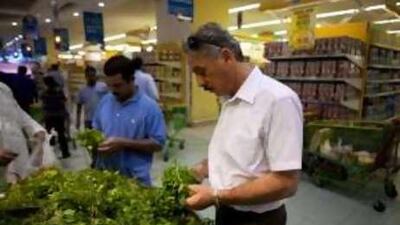ABU DHABI // Supplies of fresh herbs are running low in supermarkets because of more stringent testing for pesticides. The shortages come just as demand peaks for curry leaves, parsley, coriander and mint, as more people cook at home during Ramadan. Output from India, Oman, Jordan, Egypt and Syria traditionally slows anyway during the summer months.
Supplies have dwindled further as the UAE subjects herbs to more stringent tests to see if the leaves meet internationally accepted standards for permissible levels of pesticides, said Mohamed al Reyaysa, the director of the communication and community service division at the Abu Dhabi Food Control Authority. Food found with pesticide traces higher than permitted levels are immediately banned, he said, since they are a health risk.
Lulu Hypermarkets is still recovering from a ban on curry leaves from India imposed last year, after pesticide levels were found to be too high, Zulfikar Kadavath, the purchase manager of fruits and vegetables with Emke Group, said. "We started buying from Oman but then we had to stop because of quality issues," he said. "There was no fragrance." A small batch from each shipment that arrives is tested by the authorities, Mr Kadavath said. "If we receive 100 boxes, then one box goes to the laboratory. Only after they are approved, we sell. Otherwise they are destroyed."
Prices are being maintained in the markets, but in the wholesale sector the cost of curry leaves jumped to Dh40 a kilo from Dh8 a kilo last year, because of reduced supply and increased demand, Mr Kadavath said. Quality can also be affected, he said. "Leaves are very sensitive. It is a challenge to maintain freshness." Raja Malick, the managing director of Mahmood Malick International, a wholesale supplier of fresh herbs to the market, is also finding that supply cannot meet demand.
A retailer who receives 3,000 bundles a day would double that order in July, August and September. Extreme heat in importing countries does not help to boost supplies either. At the moment, parsley is most in demand, followed by coriander and mint. "It may seem at times that parsley is almost not available," he said. Wholesalers are under instructions not to increase prices, meaning "the cost of buying is more than the cost of selling".
Restaurants, many of which are open for only half their usual hours during Ramadan, are not so badly affected. Tandoori Corner on Airport Road in Abu Dhabi has been ordering fewer supplies. "Every day we get fresh herbs early in the morning," said Devendra Rawat, the manager. "With Ramadan, the timings have changed to a few hours delay but the rest of the things, including the freshness, are OK."
Praveen KK, the manager of India Palace, said the restaurant has escaped from price and supply fluctuations. "We have enough from the purchasing team and what they bring in," he said. "It has been very smooth." @Email:sbhattacharya@thenational.ae

